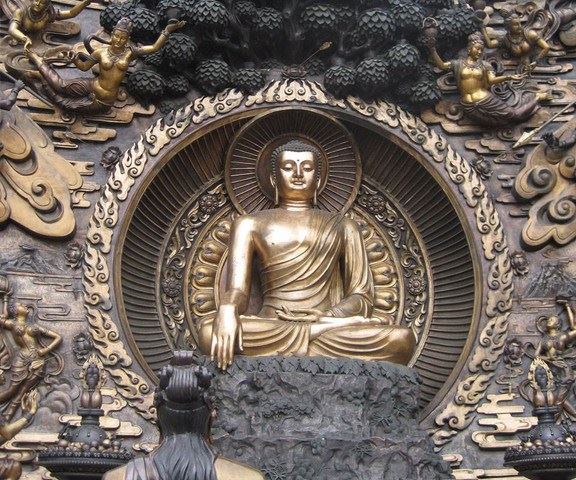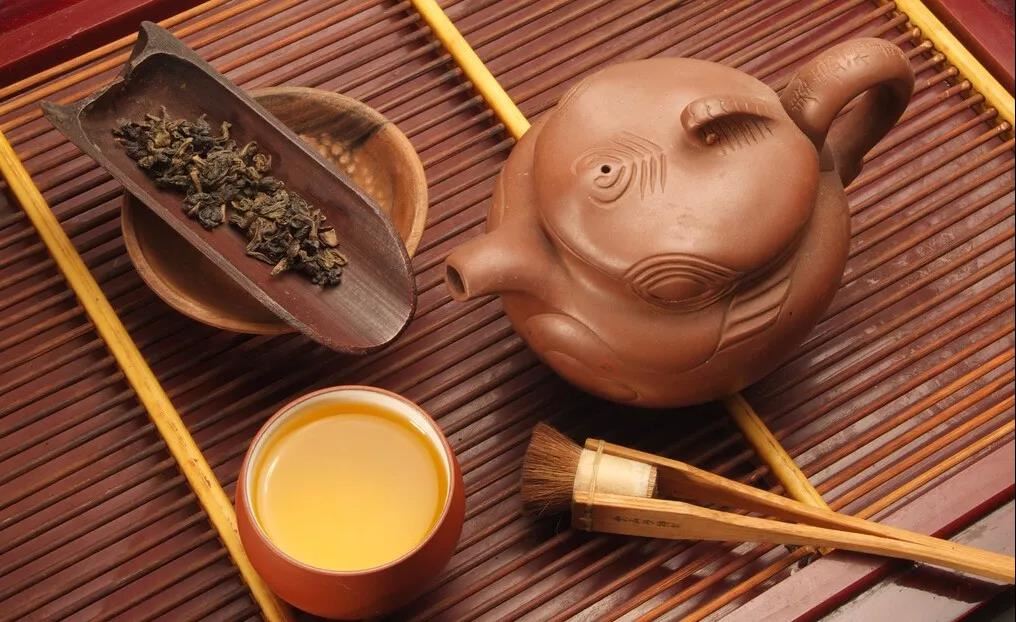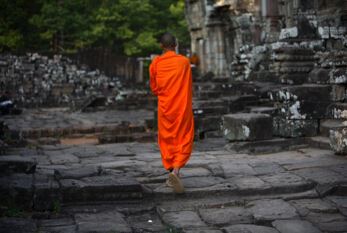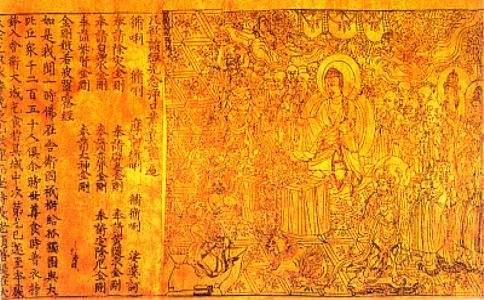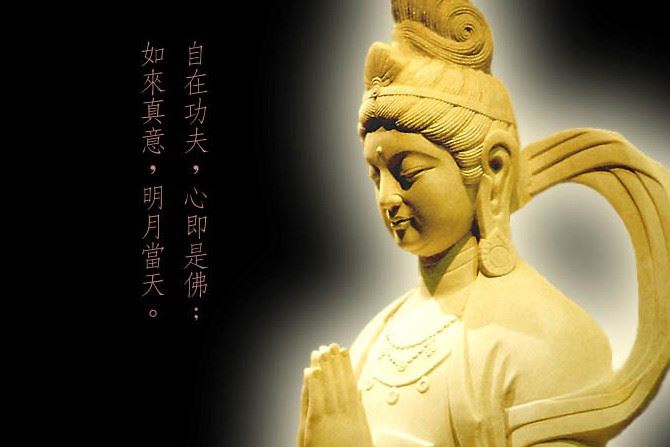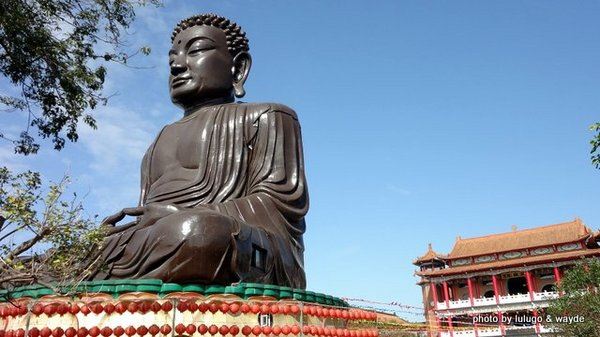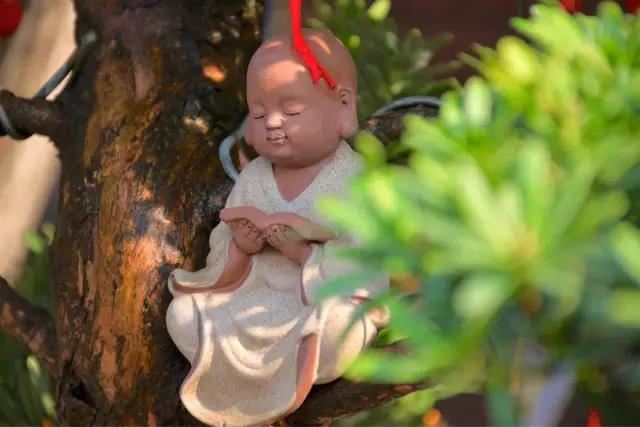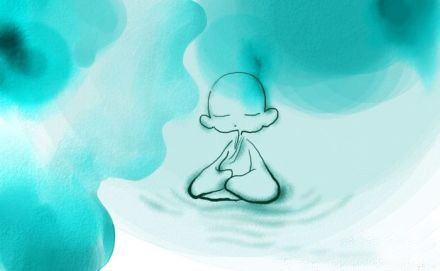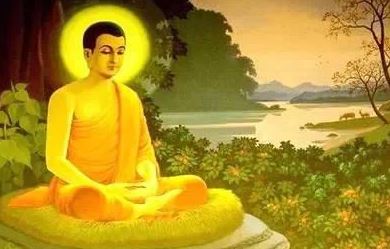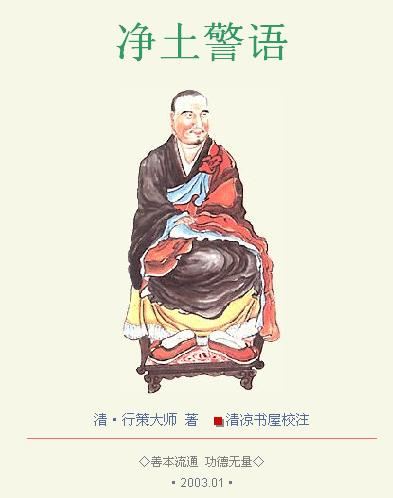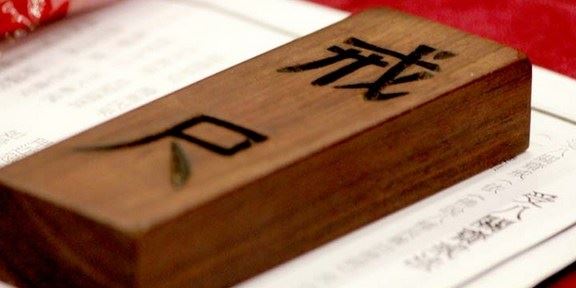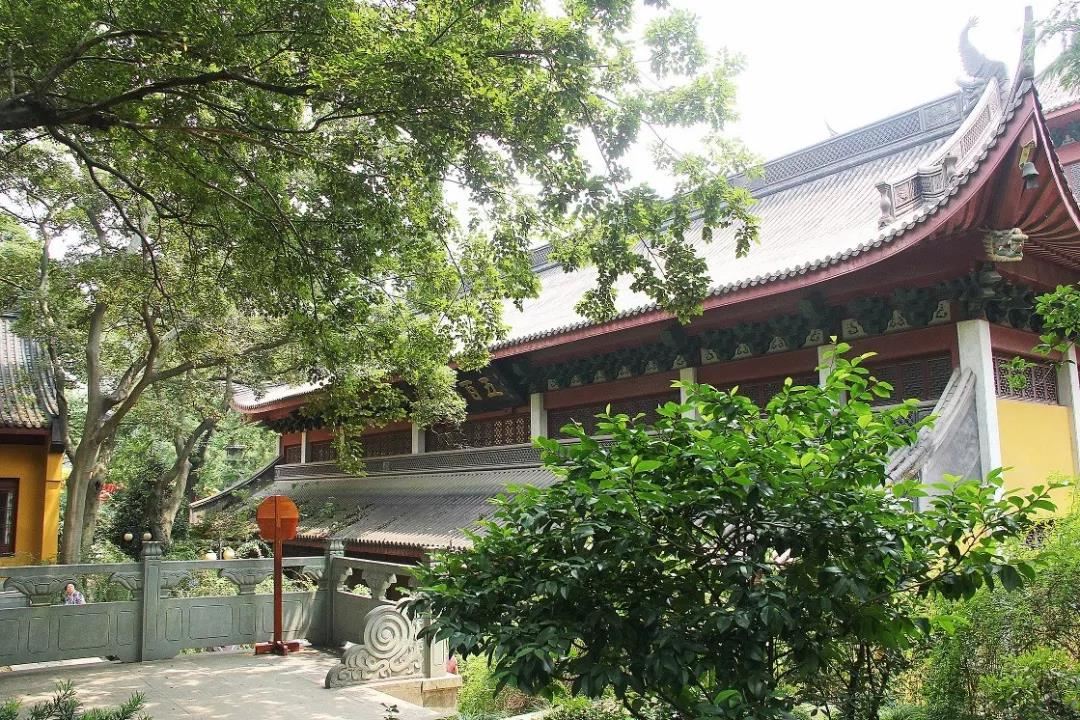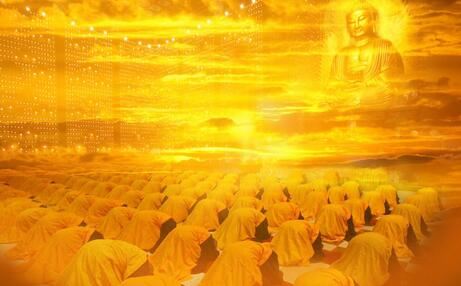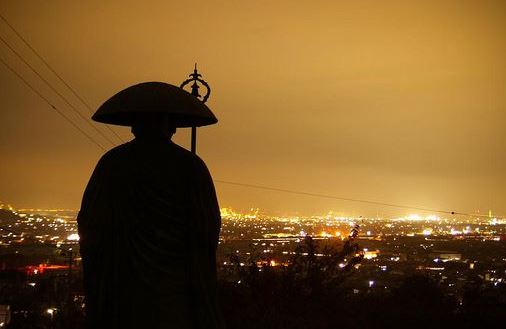On Practice XIII 【修行 (十三) -英文】
2022-10-27 外文文稿
修行就是要去除贪念,因为如果有贪念坏种子在我们心里,心会散乱,就不会有正念,一天到晚这个心都被这些坏念头〔翻来覆去〕的,看这个也不对,看那个也不对,无明烦恼一大堆,被转得身心都不自在。
One of the goals of practice is to eliminate the sense of greed. When tainted by the seeds of greed, our minds will easily become scattered and we will not be able to retain right mindfulness. Thereupon, our minds will be swamped with endless ideas and become restless and discontented, which in turn will create endless delusive vexations. Under such circumstances, we can never feel free or at ease.
素食不仅是修行的助缘,又可戒杀,免落因果。〔吃人一斤肉,还人十六两。〕冤冤相报、六道轮回、因果循环丝毫不爽。所以不吃杀生的东西,不贪口味,不但可以去掉贪念,不必每天为〔口欲〕的事情贪求忙碌,又可不造恶业、解冤释结、长养慈悲心,同时我们的心也会清净自在,这就是在修〔色、声、香、味、触、法〕,对治六根对六尘的执着。
Vegetarian diet is a positive auxiliary cause for practice. It is a good living style for practitioners to keep the precept against killing and help avoid unpleasant causal results. We have to be aware that the karmic obstructions created by killing for food eventually have to be repaid in full. The eater will be eaten, rounds within the six destiniesThere is no escape from the laws of causality and rebirth. Eliminating our desire for taking the other living beings carcass for food will bring a great relief. Not only will we be free of enslaving ourselves just to satisfy the desire of our mouth, but also will we avoid creating more negative karma while cultivating our sentiments of loving kindness and compassion. Therefore, vegetarian diet will help us to purify and liberate our minds by relinquishing the attachments of our sense bases to the six sense objects (gunas).
五浊恶世----劫浊、见浊、烦恼浊、众生浊、命浊中,这里面包含我们众生的一切习气,一切烦恼,还有过去世带来的所有坏种子。而这些东西都是由〔色、声、香、味、触、法〕引起的,也就是六根对六尘的接触,由六识起分别作用,产生出来的种子现前,所造出来的业,才会有这个五浊恶世。
The evil world of five turbidities, which includes the turbidity of kalpas, the turbidity of views, the turbidity of vexations, the turbidity of sentient beings and the turbidity of life spans, contains and manifests all our habitual patterns, vexations and sinister seeds from previous lives. In other words, we, the sentient beings created the evil worlds of five turbidities. When the six sense bases touch the six sense objects, consciousnesses arise. The consciousnesses make discriminations and bring forth the seeds of karma. It is the seeds of karma that created the worlds.
修行要福、慧双修,而〔皈依佛,两足尊〕,这两就是〔福、慧〕。至于〔福〕从哪来呢?我们如果能吃苦、忍苦,苦出头了,就有福。有福就能消业,待业障消除,佛智就会现前。所以〔忍辱第一道〕,能修〔忍〕的人,必能成就道业。
Our practice should aim at attaining both virtues and wisdom. Take refuge in the Buddha, the perfect one in both virtue and wisdom. Where do virtues come from? They grow out of forbearance. With genuine forbearance, we can accumulate virtues and eventually will be able to enjoy blessed rewards and reduce our negative karma. When our karmic obstruction is eradicated, the Buddha-Prajna will unfold. Thus, forbearance is the first principle of the path to buddhahood. Those who practice forbearance will attain supreme enlightenment.
出家要舍悭贪,从衣食住行里来修 〔色、声、香、味、触、法〕去修,才可以了生死,因为有这些六根对六尘,六识在分别起作用,所以生出种种贪念来。我们的念头从这里来,就要从这里去断,这是我们生死的根本,生死的路就是从这里去走。
One basic principle of monastic practice is to eliminate greed. We can start by eliminating our cravings for the six sense objects (gunas). This is the initial step to break out of the cycle of birth and death. As we know, consciousness arises from the six sense bases touching the six sense objects (gunas) and cravings come to be because of the discriminating of the consciousness. We have to eradicate greed from where it originates. Such practice is fundamental and is crucial to whether we can escape samsara or not.
今世我们有这个因缘得到人身,并且能到三宝门中皈依三宝,乃是过去世我们曾在寺庙礼佛、拜佛、供养三宝、布施、念佛等,在佛前种下善根,这世才有这个佛缘来皈依三宝。但为什么要皈依呢?佛陀说世间有八苦----〔生、老、病、死苦、求不得苦、爱别离苦、怨憎会苦、五蕴炽盛苦。〕凡是做人,这八苦都是无法避免的。只有皈依三宝,来学佛修行,才能跳出娑婆世界轮转生死的苦海。
The fact that in this life we were born as human beings and are willing to take refuge in the Three Jewels(triratna i.e. Buddha, Dharma, and Sangha)is because in previous lives, we have knelt down before Buddhas and prostrated, made offerings and almsgiving intemples, or recited the names of the Buddhas, etc. thus planted wholesome root before Buddhas. But why do we have to take refuge in the Three Jewels? Sakyamuni Buddha taught us that there are eight kinds of misery from which we constantly suffer: birth, aging, disease, death, separation from loved ones, company of hated ones, failure to obtain what we desire, and craving for the five aggregates (skandhas). As long as we are human, we cannot escape from such pains. The only way out of this suffering of rebirths is to take refuge in the Three Jewels, follow Buddha and practice according to the teachings of Buddha.
这世间的一切都是因果循环,不论在家出家都一样。我们学佛修行,乃至宇宙间的一切,也是不出这〔因果〕两字。譬如我们就是过去世有种出家的善因,这世才能出家修行,而这世我们再来修行也是种未来成佛的〔因〕。所以有〔因〕就有〔果〕,娑婆世界里种种一切的事情,乃至心内一个动念,都是有因果的。佛陀所说的经典也都是在这〔因果〕,出家的因要〔正〕,要为发菩提心出家,为解脱生死出家,不是为了某事或逃避现实或受到刺激才来出家。如果因为这些事情,因这条件来出家,这个道心一定不会坚固,时时都会被坏念头转走,不会有正念。我们出家要有坚强的愿力,意志要坚定!不论遇到多困难的〔境〕,多艰辛的障碍都可以服。如果没有这个愿力就无法成佛,所以佛陀叫我们要〔忏悔发愿〕,这条修行的道路才会走得圆满。
The law of causality applies to everyone, whether you are a lay person or a monastic practitioner; it also applies to everything that happens in this universe. For instance, the reason that we are able to leave home for practice in this life is due to the wholesome cause we planted in our previous lives. That we follow Buddha to practice in this life again, on the other hand, plant the cause for our attaining buddhahood in the future. Hence, where there is a cause, there is a result; everything that happens in this Saha world, even just an idea that crosses the mind, will have its effect. All teachings of the Buddha recorded in the sutras are premised on this law of cause and effect. We must have right cause to become monastic practitioners, i.e. a vow to attain supreme enlightenment for the deliverance of all sentient beings, or a desire to be liberated from the circle of birth and death. If we entered a monastery because we experienced unbearable blows or because we wished to evade hardships or reality, we would not have the firm determination indispensable for monastic practice. We might easily be overtaken by other ideas and would not be able to retain right mindfulness. We all need a strong resolve when entering the monastery so that we can overcome all adversities--however difficult they may be. No attainment of buddhahood is possible without it. Therefore, the Buddha taught us to repent and make grand vows so that we can tread the path of practice with success.
我们每个人从无始劫以来所造的杀业无量无边,譬如单就所食的一碗饭里就不知道有多少众生?要杀多少众生才有这碗饭吃!况且现在所种的东西几乎都要洒农药,而这也是杀生,虽然不是我们直接杀的,但是也有果报存在。所以这世如果不努力修行,求生西方极乐世界,仅是这个杀业我们就没办法偿还!
In the eons, we all have accumulated immeasurable and illimitable karmic obstructions through killing. For example, a bowl of raw rice contains immeasurable beings and they are killed in cooking. Further, using pesticide in growing farm products is also a form of killing. Despite the fact that we do not commit these killings directly, we still have to bear certain consequences. If we fail to practice diligently to ensure our rebirth in the Pure Land, we cannot even redeem the karma resulting from such indirect killings in this life!
出家修行要有愿力,不要为了一些不如意的小事或身体微恙就心生烦恼,应该很庆幸这一世可以出家修行,这乃是我们过去世有种修行的因;如果因为身体不好,就影响我们修行的心,就是没有智慧,被这个身体〔度〕走了。要拿出道心来!发菩提心修行可以克服一切的境界,一切烦恼。有因就有果,不要再种世间的因了,要种了脱生死的因。若能常念〔阿弥陀佛〕,心清净,没烦恼,就时时刻刻都在种好的因、成佛的因、往生极乐世界的因。既然我们有念佛的因,就一定有成佛的果。
We monastic practitioners ought to have strong resolve. Do not be perturbed by petty agitation or minor diseases. Rather, we should count our blessings that we sowed the seeds in previous lives thus have attained the opportunity to leave home for practice. If, however, our resolve wavers due to ill health, it indicates a lack of wisdom on our part and the fact that we are reigned by our physical body. Hence, show your determination! A vow to attain total enlightenment will enable us to overcome all adversities and eradicate all vexations. Every cause has its effect, as every effect arises from a cause. Do not sow more seeds of rebirth within the six destinies; sow seeds of liberation from the cycle of birth and death. If we constantly recite the name of Amitabha Buddha and keep our minds focused and free of vexations, we are sowing good seeds that will result in our attainment of buddhahood and our rebirth in the Pure Land. Once we have the cause of reciting the name of the Buddha, it is certain that we will attain the effect of attaining buddhahood.
出家修行要〔发心〕,培褔修功德。人家不做,我们去做,人家没看到而我们看到的地方我们就做,即使别人在休息时,尚未做完的事你看到了,也要随时〔发心〕去做,不可以说:〔那不是我的工作,那不是我的事。〕不要这样想,否则不但没功德,在修行上也没办法突破。应该随缘心,因为出家这一法是无上法,如果没有〔常住〕,不能成就佛道。
Monastic practitioners should vow to work for the benefit of others so as to accumulate merits and virtues. We should be willing to do whatever others refuse to do, or anything that could have been ignored by others. Pick up the unfinished job when others are taking a break from; do not complain that this is not my assignment, or it is not my business. Otherwise, neither would we accumulate merit, nor would we expect any breakthrough in our practice. So, constantly offer ourselves to serve public interests. We should know that leaving home to go to monastery to practice Buddhism is an unsurpassed dharma. However, if one cannot consistently keep the unsurpassed dharma, it would be impossible for him/her to attain buddhahood.
------Translated from Analects of Master Kuang-chin(编译自《广钦老和尚开示录》)
2024-02-04 21:54微信分享
扫描二维码分享到微信或朋友圈

